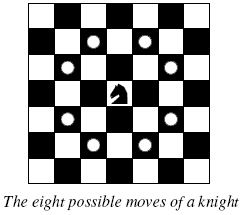标签:
| Time Limit: 1000MS | Memory Limit: 65536K | |
| Total Submissions: 32823 | Accepted: 11178 |
Description
 Background
Background Input
Output
Sample Input
3 1 1 2 3 4 3
Sample Output
Scenario #1: A1 Scenario #2: impossible Scenario #3: A1B3C1A2B4C2A3B1C3A4B2C4
题意:给出一个规格小于8*8的棋盘,判断一个只能走“日”的骑士能否不重复的走遍整个棋盘,如果能,按字典序输出走的路径,否则输出“impossible”
思路:其实这道题唯一的难点就是按照字典序输出,只要解决了这个就是一个简单的dfs。其实在做很多题的时候我们在设置走的路径的时候都是随意设置的,这道题则不行,既然是按照字典序输出,则你设置路径的时候先按照列排序,让小的在前面,然后列的字母相同时,你按照行排序,同样让小的在前面。
#include <stdio.h>
#include <string.h>
#include <stdlib.h>
#include <iostream>
#include <algorithm>
#include <set>
#include <queue>
#include <stack>
using namespace std;
char map[30][2];
int vis[30][30];
int p,q;
int jx[]={-2,-2,-1,-1,1,1,2,2};
int jy[]={-1,1,-2,2,-2,2,-1,1};
int dfs(int x,int y,int cnt)
{
int i;
if(cnt==p*q){
return 1;
}
for(i=0;i<8;i++){
int dx=x+jx[i];
int dy=y+jy[i];
if(dx>=1&&dx<=q&&dy>=1&&dy<=p&&!vis[dx][dy]){
map[cnt][0]=dx+'A'-1;
map[cnt][1]=dy+'0';
vis[dx][dy]=1;
if(dfs(dx,dy,cnt+1))
return 1;
vis[dx][dy]=0;
}
}
return 0;
}
int main()
{
int n,i;
int icase;
scanf("%d",&n);
for(icase=1;icase<=n;icase++){
memset(map,0,sizeof(map));
memset(vis,0,sizeof(vis));
scanf("%d %d",&p,&q);
vis[1][1]=1;
map[0][0]='A';
map[0][1]='1';
printf("Scenario #%d:\n",icase);
if(dfs(1,1,1)){
for(i=0;i<p*q;i++)
printf("%c%c",map[i][0],map[i][1]);
}
else
printf("impossible");
printf("\n\n");
}
return 0;
}
POJ 2488-A Knight's Journey(dfs)
标签:
原文地址:http://blog.csdn.net/u013486414/article/details/43876255